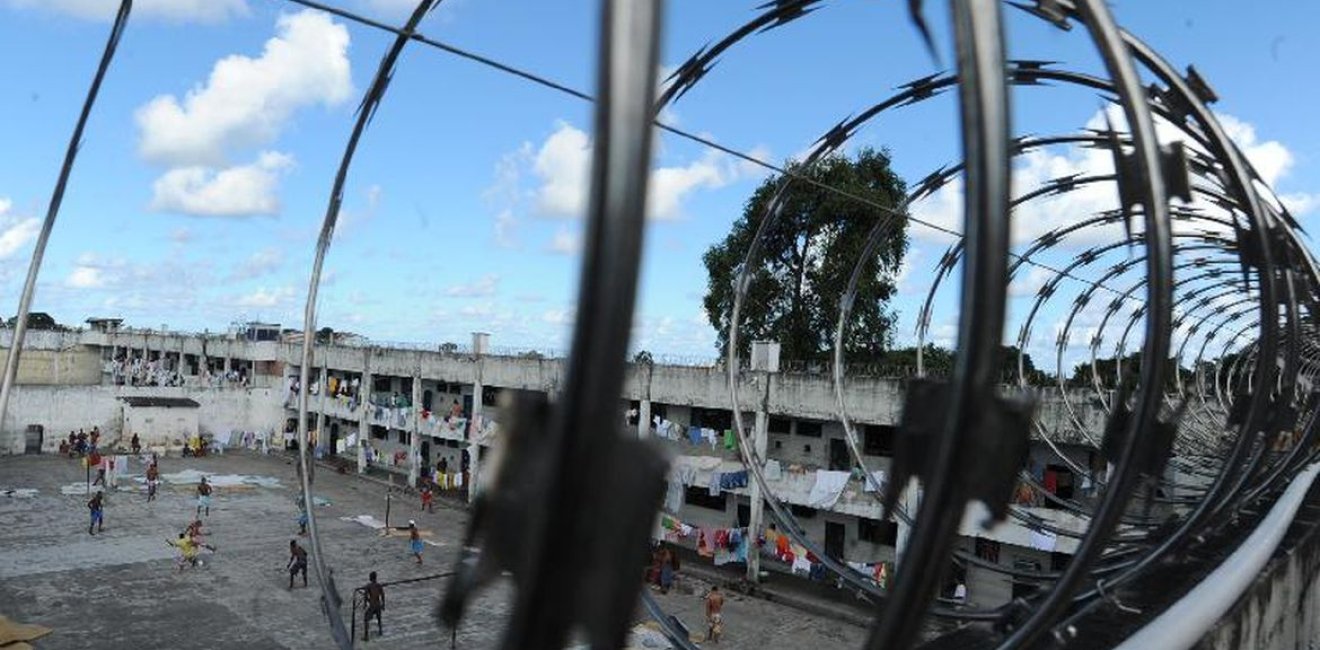
A blog of the Brazil Institute
When Covid-19 first reached Brazilian favelas, the Brazilian Report reported on the risks for low-income populations who live in poorly-urbanized, densely-populated areas, where social isolation is often an impossibility. But no area is as potentially favorable for the widespread transmission of the novel coronavirus as Brazilian prisons—once described by a former justice minister as “dungeons,” after he said he would rather die than spend a night in a Brazilian jail cell.
As of June 2019, Brazil had 750,000 inmates—36 percent of them still in pre-trial detention—cramped in jails that have, combined, the capacity to house only 460,000 people.
Mass incarceration has exploded over the past 20 years in Brazil. In 2000, the country had “only” 233,000 prisoners. This uncontrolled growth in the number of inmates, without significant corresponding growth in prison capacity, turned Brazilian prisons into breeding grounds for diseases and cesspools of human rights violations. A 2017 survey by the Health Ministry and the Oswaldo Cruz Foundation showed that the chance of a Brazilian inmate catching tuberculosis is 30 times greater than that of someone outside of the system.
HIV/AIDS is another disease that haunts the Brazilian prison population. The most recent survey on the presence of the virus in prisons, dating back to 2015, shows that the incidence of the virus was 138 times higher in prisons than among the general population: 2,190 cases for every 100,000 inmates, against Brazil's rate of 15.8 per 100,000.
This spread of disease is aggravated by the lack of adequate medical care within prisons. A survey by the National Council of the Prosecutor General's Office found that 31 percent of Brazilian prisons lack minimum hospital infrastructure for prisoners. The worst-case scenario is observed in the Northeast region, where 43 percent of prisons are not equipped to care for their inmates.
Will Covid-19 Ravage Brazil's prisons?
In 2017, Amnesty International launched a project telling inmates' stories to shed light on this reality. One such account was given by a man named Emerson, who shared a 3-square-meter cell with 40 men for four years. In such conditions, recommending social distancing seems like a cruel joke.
To try and avoid a potentially devastating scenario, the National Justice Council (which oversees the prison system) issued a recommendation that a number of prisoners to be placed under house arrest. The measure covers those convicted of non-violent crimes—such as theft, unpaid alimony, or fraud—and those who, regardless of their crime, are already entitled to progress to open or semi-open prison regimes. Inmates serving sentences for unpaid child support have already been released to serve their sentences at home.
Two decisions of the Superior Court of Justice (Brazil's second-highest judicial body) ruled that these people should not be incarcerated while the COVID-19 pandemic lasts. Others who have benefited from the measure are those arrested for corruption, often politicians and businessmen, such as former lower house speaker Eduardo Cunha.
According to lawyer Daniela Meggiolaro, chairperson of the Criminal Law Commission at the São Paulo branch of the Brazilian Bar Association, the justice system has slowly complied with the ruling. One of the reasons for the delay is the fact that judges are currently working remotely due to the pandemic.
“Lawyers are having a hard time figuring out how to talk to the judges, and the responses have been perfunctory. And many lawsuits do not go ahead, even with defendants subject to COVID-19,” says the lawyer.
One such case is that of a 64-year-old man detained in a São Paulo prison. Convicted of murder in the 2000s, this prisoner has served time in a semi-open regime since 2018. Despite being diabetic and having heart issues—which places him in a high-risk group—a judge denied him the possibility of house arrest.
According to his lawyer, Welington Arruda, the prison administration itself has already admitted it is unable to care for the prisoner. “Prosecutors suggested that he should do his time at home or be transferred to another prison, as there is a real death risk associated with the lack of infrastructure in the prison," said Mr. Arruda
Powder Keg
São Paulo's Tremembé penitentiary was one of five units in the state that registered riots and prison breaks one month ago. Altogether, almost 1,380 prisoners fled five state prisons after the courts suspended family visits and care packages.
Sister Petra, a national coordinator at the Prison Pastoral, says that visit suspensions put enormous pressure on prison administrations. She told The Brazilian Report that, during the same period of the escapes in São Paulo, small riots also erupted in other two states. “We understand visit restrictions, but it makes no sense to prevent families from sending food and other items,” says Sister Petra.
Another major problem aggravated by Covid-19 is the continued rationing of water, according to Maíra Fernandes, who chaired the penitentiary council in Rio de Janeiro—one of the states with the most pressing prison problems in the country. “Deaths inside the prison system are naturally underreported, regardless of COVID-19. When the virus spreads in prisons, penitentiaries can serve as a greenhouse for the pandemic,” warns the lawyer.
Free at Last?
The release of prisoners to avoid increasing COVID-19's death toll in Brazil has unsurprisingly become a divisive issue. Many conservatives have argued that criminals are benefiting from the situation, while “law-abiding citizens” are asked to stay home.
One politician who has come out against furloughs and house arrest orders is Congressman Alberto Neto. He contends the lack of minimum health conditions is just an excuse for organized crime to thrive, and argued that prisoners would be safer separated from the outside world.
“The National Justice Council has overstepped its role. The World Health Organization and the Ministry of Health do not recommend the release of prisoners,” he said.
Meanwhile, Senator Major Olímpio has argued that prisoners shall only be treated for COVID-19 in prison hospitals. Regular healthcare facilities “should only be for the Brazilian population,” he said, perhaps without realizing that prisoners’ rights are protected by the Brazilian Constitution.
However, Sister Petra warns that the presence of COVID-19 within prisons is being massively underreported. Brazilian prisons counted just 115 suspected infections as of the second week of April, but none had been confirmed. “The government says it has a prevention plan, but that is pure lies and deception. Anyone familiar with the prison system knows that a room with four beds and 80 people is impossible to clean.”
Like the content? Subscribe to the Brazilian Report using the discount code BI-TBR20 to get 20 percent off any annual plan.

Author

Brazil Institute
The Brazil Institute—the only country-specific policy institution focused on Brazil in Washington—aims to deepen understanding of Brazil’s complex landscape and strengthen relations between Brazilian and US institutions across all sectors. Read more

Explore More in Brazil Builds
Browse Brazil Builds
They're Still Here: Brazil's unfinished reckoning with military impunity




